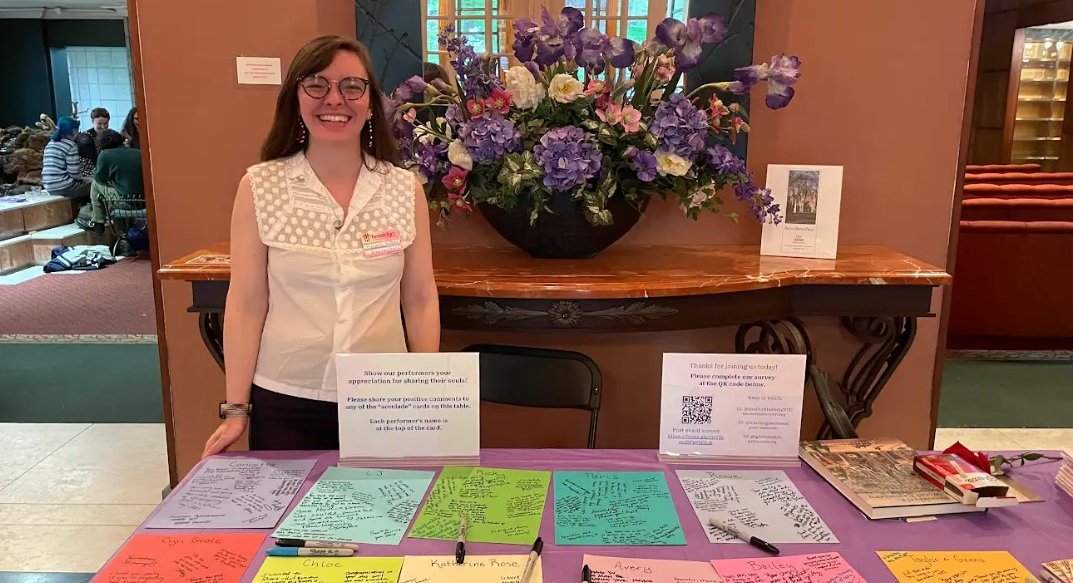Grieving a parent can be hard on anyone, but there are sometimes additional challenges for young LGBTQ+ adults.
“I am grieving the fact that I will never be able to have another conversation with my mom about my queerness, orientation and who I am,” said Arely Guzman, 30, who was attending an event called “Death of the Party,” held at Sparrow funeral home in Greenpoint. “I think she would’ve been okay with it, but I’ll never know.”
Some young LGBTQ+ adults are grieving people who never fully knew or accepted them. Often, there’s the isolation of being the first person among their peer group to lose a parent, meaning they’re less likely to have support from friends.
That’s why dozens of New Yorkers attend a “Death of the Party” event every few months. Moderated by Melanie Wilson, 31, these are gatherings – often held at funeral homes or cemeteries – where queer folks and their allies can mourn and process their lost loved ones in a space where they feel seen and understood.
Guzman, who uses they/them pronouns, lost their mother in 2019, two years after coming out to her. After that initial conversation, their parents never mentioned their queerness again.
“As long as we don’t bring it up, it’s like it didn’t happen. I wish I was braver and just had a conversation with her about it,” Guzman said.
Adam Blum, a therapist and director of the Gay Therapy Center, whose mission is is “to help LGBTQ people learn to love themselves and each other,” said that experiences like Guzman’s are common.
“LGBTQ people are more socially isolated than people of other communities,” Blum said. “Often we are rejected or made to feel like an outsider, within our close family network.”
Blum added, “The core question is: If my mother knew me as my true self, would she still love me, or is her love conditional? That can complicate grief because we cannot always get the answers to those questions.”
Blum, who has never attended a “Death of the Party” event, said it could fulfill a vital role for LGBTQ+ individuals, helping them find supportive communities, especially during difficult times of life, death and mourning.
Wilson, who founded “Death of a Party,” moved to New York City after her father passed away five years ago in order to be closer to loved ones who live in Long Island.
As she started attending LGBTQ+ parties, she found herself inevitably bringing up death when people asked what prompted her move. That’s when she realized she was the “death of the party,” often adding a dark twist to friendly conversations.
She said she wanted to create a space where that was normalized, and in June 2023, she held her first “Death of the Party” event at Bluestockings Bookstore.
“This mixer is an antidote to awkwardness at public events for grieving folks and their allies,” Wilson said.
On a Saturday earlier this month, Death of the Party held a meet-up in a chapel inside Green-Wood Cemetery in Brooklyn. About 70 people were there, including performers and volunteers, mostly Gen-Z and millennials.
The program included a mix of comedy, musicians and more. A note at the sign-in warned guests that the lineup would include some potentially triggering topics, such as homophobia, trauma and violence.
The night kicked off with a “Soul Showcase,” an open-mic style performance about grief and loss, centering voices of the LGBTQ+ community.
Paris Beato, 27, picked up her guitar to perform an original song she wrote for her mother called, “Not Many Do,” about a woman who grappled with self-doubt, mental illness and alcoholism and never fully pursued her dreams.
Beato said she had written many sad songs about her mother but this one was a way to commemorate her mother’s love for music, as it remains to be a refuge for her even after her mother died.
Next, stand-up comedian Ricky Sim took the podium and performed an excerpt from his one-man show, “Coming out to Dead People.” It describes Sim trying to understand his mother’s feelings after his death, but encountering more questions and grief.
In 2005, Sim’s mother was undergoing chemotherapy when his conservative Chinese-Malaysian relatives discovered a photo of him at the New York City Pride March. Shortly after, word reached his mother.
In 2006, after her death, Sim discovered a brochure among her belongings. It was from an LGBTQ organization, titled, “My child just came out of the closet. What should I do?”
“Maybe that was the beginning of her process of understanding, or maybe not understanding,” Sim said, in an interview after the show. “But she sort of took the first step weeks and months before she passed away. Can I definitely say my mom accepted me? No. I just have to accept the fact that some acceptance has to come in a different form, and this is the acceptance that I was being given.”
Sim said a big part of why he is doing the show is so that “people could feel less alone, if they are going through a similar long, aggravating and frustrating journey. There’s ways to find closure.”
His show will make its off-Broadway debut later this month at the SoHo Playhouse.
After the performances was the mixer, where approximately 40 people gathered to enjoy light refreshments from local LGBTQ+ businesses.
Robin Silver and Cassandra Biron, both death doulas, said they were there to educate themselves on the needs of young LGBTQ+ grievers in their community, and to, as Silver put it, build a “community of morbid babes.”
“These are spaces that people know they need but they don’t know who to ask or where to go,” Biron said.
To learn more about upcoming Death of the Party events, visit here.





